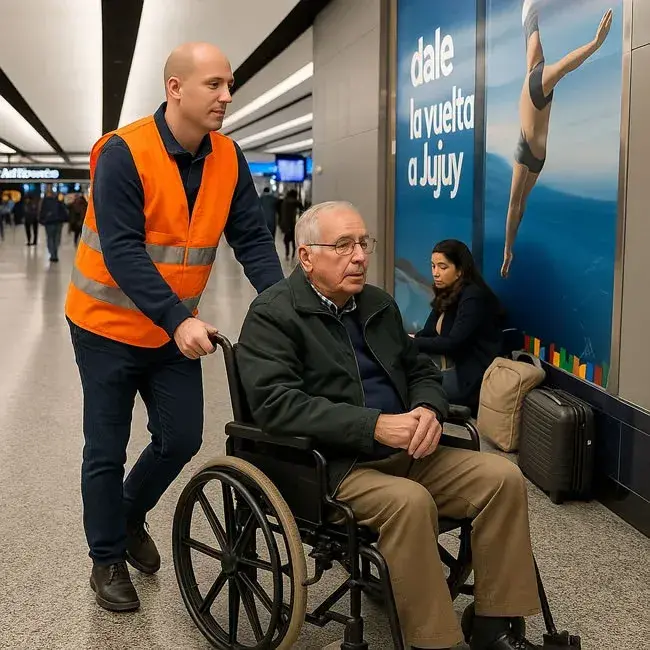NON Official. Visitors wishing to reach the official site should visit Aeropuertos Argentina
Passengers with Special Needs at Ezeiza
Ezeiza Airport has implemented various programs to assist passengers requiring special attention, aiming to offer a more inclusive and accessible experience. However, the quality and effectiveness of these services can be inconsistent. While the dedication of the staff is often praised, coordination failures and infrastructure deficiencies can turn a process that should be helpful into a source of stress. This guide, based on the analysis of real experiences, details the available services and the critical points to consider.
Frequently Asked Questions about Special Assistance
What is the wheelchair assistance service like?
It is very variable. On one hand, many users highlight the excellent care and dedication of the staff providing the assistance. On the other, there are recurrent complaints about the lack of staff or cases where the assistant abandons the passenger before completing the journey, causing great distress.
What specific support exists for travelers with autism (ASD)?
The airport has a protocol in collaboration with the Brincar Foundation that gives priority to the passenger and their family at all checkpoints. It is a highly valued service, but it requires completing an online form 48 hours in advance and also notifying the airline.
Who should I request assistance from: the airport or the airline?
Both, and this is the key. The fundamental recommendation is to coordinate the assistance with your airline at least 48 hours in advance. Additionally, you can contact the airport for specific programs like the one for ASD. The lack of communication between both parties is a common cause of problems.
Is it easy to find disabled parking?
No. It is one of the strongest criticisms. Users report that parking for people with disabilities is poorly signposted, difficult to find, and often occupied by vehicles without the proper authorization.

AI-generated image
Traveler's Handbook: Critical Points to Watch
The Inconsistency of Assistance Service
The experience is unpredictable. You may receive exceptional care or, as several users report, be abandoned by the assistant in the middle of the process (for example, at the baggage carousel), having to rely on the help of other passengers.
Infrastructure and Signage Deficiencies
The airport has physical barriers. The lack of sufficient moving walkways forces long walks. The general signage is confusing, and this is aggravated in the case of accesses and parking for people with reduced mobility.
The Double Bureaucracy: Airport and Airline
The success of the assistance depends on proper coordination between the airport and the airline. If one of the two parties is not duly notified, it is very likely that the service will fail. The responsibility falls on the passenger to ensure this double communication.
The Human Factor: Heroes and Villains
While most positive reviews focus on the warmth and professionalism of specific employees, the negative ones point to staff with little empathy or who do not know how to give clear directions, showing that the quality of the experience depends too much on the individual you happen to get.
Assistance Programs and Specific Protocols
The airport, in collaboration with various foundations, has developed protocols to attend to passengers with specific needs. It is essential to contact them in advance to ensure their correct implementation.
People with ASD (Autism Spectrum Disorder)
In collaboration with the Brincar Foundation, there is a priority attention protocol for the passenger and their family group at all stages of the airport. This service is highly valued by families.
To access it, it is essential to complete the assistance request form 48 hours in advance and also notify the airline. The airport offers downloadable guides to facilitate the journey:
- Domestic Arrivals Guide
- Domestic Departures Guide
- International Arrivals Guide
- International Departures Guide
People with Reduced Mobility
The staff receives training from the civil association ALPI. Wheelchairs can be requested at the customer service desks for use in public areas. The airline is responsible for providing assistance from the check-in counter to the aircraft.
User Experience:
The staff who perform the transfer often receive praise for their humane and dedicated treatment. However, the reliability of the service is the main point of criticism. Several users have reported being "abandoned" by the assistance staff at the baggage carousel or in other parts of the journey, which represents a serious failure in the service.
Deaf People and People with Down Syndrome
Thanks to collaborations with the SEA Foundation and the ASDRA Foundation, the staff at the customer service centers are trained in sign language and in specific care protocols to guide passengers who require it.
General Recommendation and Key Contact
For any questions regarding the cases mentioned, as well as for pregnant women, the elderly, passengers with pets, or minors traveling alone, the most important action is to contact your airline.
You must coordinate all details, required documentation, and the formal request for assistance at least 48 hours before your flight. The airline is the main responsible for coordinating the services within the restricted area of the airport.
